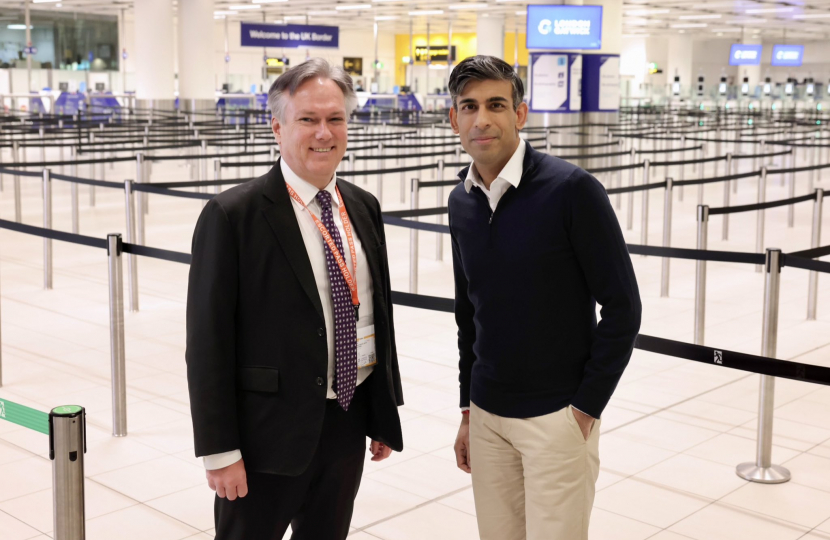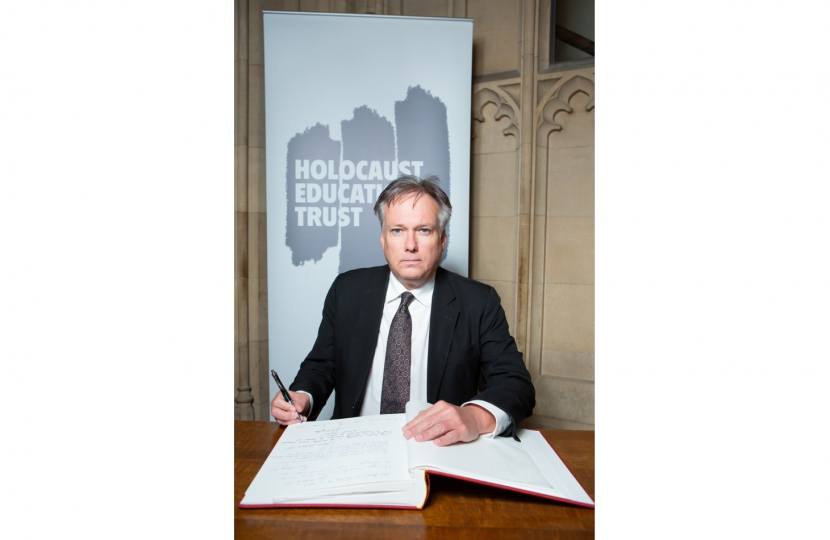Henry Smith MP – Westminster Report – January 2024
Securing the best start in life for the next generation
There can be few more important tasks than securing the best start in life for the next generation.
Today, the opportunities for our young people can lie across the globe and a world-class education is vital to ensure all are helped to fulfil their potential.
We have seen education standards in England rise greatly since 2010. Some 89 per cent of schools are now rated good or outstanding by Ofsted, up from just 68 per cent 14 years ago.
This does not happen overnight. It is only possible as a result of the incredibly hard work and dedication of teachers who continue to put in that extra mile to challenge, inspire and support their pupils to achieve.
The Programme for International Student Assessment (PISA) of 15-year-olds’ mathematics, reading and science ability is conducted by the OECD and seen as the international benchmark for academic attainment.
Last month, the most recent study showed pupils in England have significantly outperformed the international average and risen to 11th for maths: up from 17th in 2018 and 27th in 2009.
Pupils in England have also risen up the rankings in both reading and science. Back in 2009, our pupils were in 25th and 16th place for these respective subjects, rising to 13th in both now.
While these are examples of the progress being made in driving up attainment, it is vital that this is built on further, with long-term decisions needed to improve such achievements for this and future generations.
It is with this in mind that I welcome school funding being increased to almost £60 billion in 2024-25 – its highest ever level in real terms – with Crawley to benefit from a total funding increase of over £4.9 million in 2024-25, compared to 2023-24.
Pupil premium funding rates will increase: to £1,480 for primary school pupils and £1,050 for those in secondary school in 2024-25. This marks an increase of 10 per cent since 2021-22 to support schools in disadvantaged areas to raise educational outcomes for the pupils who need it most.
Last month I questioned the Department for Education about action it is taking to screen pupils for special educational needs and disabilities (SEND) in primary schools. As a Vice President of the British Dyslexia Association, support for SEND pupils is of particular importance. An extra £440 million investment is being made to support pupils with SEND.
Going forward, the Advanced British Standard – a new baccalaureate-style qualification – will see every student in England study some form of maths and English to age 18. Investment of £60 million over two years has already been announced to further improve maths education and help lay the groundwork for the introduction of this new qualification.
Earlier this month I welcomed the Prime Minister to Gatwick Airport so we could meet Border Force officers situated here who work hard every day to keep us safe.
The officers deal with issues including tackling illegal immigration and smuggling, and the Prime Minister and I were grateful to be able to speak with them and hear more about their vital work.
We also took the opportunity to speak about the importance of aviation to economic growth in our country and our place in the world for connectivity as global Britain.
As Crawley MP and Chair of the All-Party Parliamentary Group for the Future of Aviation this is a cause I continue to pursue in the House of Commons on behalf of workers locally.
Honoured to sign the Holocaust Educational Trust Book of Commitment; I pledge to remember the six million Jewish men, women and children who were murdered in the Holocaust and speak out against all forms of antisemitism, which in recent months has risen exponentially and which needs to be tackled head on.
Holocaust Memorial Day falls on 27th January every year, the anniversary of the liberation of the infamous former Nazi concentration and death camp, Auschwitz-Birkenau, in 1945.
On Holocaust Memorial Day we also remember and pay tribute to all of those persecuted by the Nazis, including Roma and Sinti people, disabled people, gay men, political opponents to the Nazis and others. We also remember all of those affected by genocide since, in Cambodia, Rwanda, Bosnia and Darfur.
Addressing illegal migration: Addressing illegal migration is an issue being faced by countries throughout the world including our own.
Progress is being made in tackling illegal migration into Britain. Small boat arrivals in 2023 were down by a third. This marked the first year that numbers have dropped since this situation began, while crossings in the central Mediterranean are up by 80 per cent.
The initial asylum backlog is down from 92,000 to fewer than 20,000, more than over 22,000 people were removed last year, and hotels are being closed through the use of alternative accommodation. All of this is welcome progress – as well as a sign of the scale of what needs to be done and that there is plenty more to do.
The effect of deterrence has been clear. Britain’s agreement with Albania saw some 5,000 people removed to Albania last year, and Albanian illegal arrivals to the UK were down by more than 90 per cent in 2023.
In Australia, the Operation Sovereign Borders programme cut the number of small boats arriving from some 18,000 a decade ago to virtually zero in subsequent years.
The UK’s largest small boats deal with France goes to tackle supply of boat engines and parts, the arresting and convicting of people smugglers, as well as a 70 per cent increase in raids on illegal working. Britain has signed returns and co-operation agreements with France, Bulgaria, Turkey, Italy, Georgia and Ethiopia.
Travelling illegally on a small boat across the English Channel after paying a people smuggler is no way for an immigration system to operate.
The Safety of Rwanda (Asylum & Immigration) Bill builds on the recent UK-Rwanda Treaty; making clear in UK law that Rwanda is a safe country for asylum seekers and answering concerns raised by the Supreme Court. The legislation reiterates that Parliament is sovereign, and follows the Illegal Migration Act 2023 and the Nationality & Borders Act 2022.
The Treaty charts a rights-based path for similar collaboration with and between other countries. Illegal migration is an issue across the world. Countries around Europe including Austria, Germany, Denmark and Italy are looking into third country models.
Our country has a proud record of providing support and protection for those who need it. Since 2015, the UK has offered a humanitarian route to Britain to more than half a million men, women and children seeking safety, as well as family members of refugees. These include people from Hong Kong, Ukraine and Afghanistan.
It must be for the UK Parliament – not the evil criminal gangs – to determine who we offer such support to.
Planes, trains and automobiles... buses also...: In between Christmas and the New Year I took a look back at my work concerning those methods of transport which we use every day, as well as the ones we may utilise on a far more infrequent basis.
In June I welcomed the Roads & Local Transport Minister to the Crawley bus depot at Wheatstone Close as a new fleet of hydrogen fuel cell buses – for operation in Crawley – was launched. Over the course of the next year or so this fleet will reach more than 50 buses, making it one of the biggest hydrogen bus fleets in the country. The fleet marks further progress to reaching Government’s target of 4,000 such vehicles.
It is almost two years since Covid-19 restrictions for the aviation sector came to an end and this industry, of such importance to the Crawley area and wider local prosperity, continues to not only bounce back but look to the future as well.
I am proud of Crawley-headquartered Virgin Atlantic for accepting Government’s challenge to fly the world’s first transatlantic 100 per cent Sustainable Aviation Fuel (SAF) flight which it achieved in November. Government must continue to support decarbonised aviation in Britain through a home-grown SAF industry.
In December I visited the upgraded Gatwick Airport railway station. The new concourse is now the entrance for passengers accessing the airport terminal from the station, while the existing concourse will be for those exiting the airport into the station itself.
The one-way system from train station to airport, as part of works which include enhanced accessibility, should ensure a smoother travelling experience for all. This project also strengthens the rail network including through enhancing services on the Brighton Main Line.
We know that the majority of people travel by road and confirmation of over £67.6 million of Government funding over the next 11 years for road resurfacing in West Sussex is a welcome boost. West Sussex County Council is to receive over £2.1 million in both this financial year and the next as part of a long-term funding plan to 2034.
We managed to thwart proposals from Mayor of London Sadiq Khan to scrap the Day Travelcard, which allows passengers to take journeys across overground and underground trains as well as buses into and around London on one ticket.
I wrote to the Mayor on this issue and organised a petition calling for the proposal to be withdrawn. It is a boost for Crawley passengers that the Day Travelcard has been saved.
Plan for Drivers: As part of the Plan for Drivers to support people’s freedom to use their own cars, the Department for Transport have launched proposals to cut traffic caused by ongoing roadworks with enhanced fines for utility companies causing them.
Currently, the £10,000 per day fine for overrunning roadworks only applies on working days. Under the proposals this would be extended to cover weekends and bank holidays as an enhanced deterrent for such works taking place on the busiest days for road travel.
Measures could also double fines up to a maximum of £1,000 for companies breaching conditions of the job, such as working without a permit.
There are also plans to ensure more targeted use of funds generated from lane rental schemes, which permit local highway authorities to charge firms for the time that street and roadworks occupy the road.
Under the proposals, at least half of money from such lane rental schemes would be used to enhance roads and fix potholes.
These measures could generate up to an extra £100 million over a decade to resurface roads, while at the same time tackling congestion and reducing journey times.
The public consultation on these measures is open until 11th March.
Banning live animal exports: It is more than a decade since I first stood up in Parliament and spoke in support of a ban on live animal exports. Many of us in Crawley have consistently supported further animal welfare protections and a stop to animals enduring unnecessary exhaustion and injury on long journeys.
These calls would invariably be met with a form of words ultimately affirming that Britain’s membership of the European Union meant that Parliament was unable to take such decisions for itself.
Now that we have left the European Union, we can fulfil the manifesto commitment to end excessively long journeys for slaughter and fattening: last month the Government formally introduced the Animal Welfare (Livestock Exports) Bill.
In Parliament I welcomed this legislation and spoke in support of its application across our United Kingdom.
Duty-free on arrival: With aviation recovering to pre-pandemic levels of travel, I am urging the Chancellor to introduce duty-free stores on arrival in Great Britain. This straightforward Brexit benefit would be a boost for Gatwick and other airports across the country, and a welcome perk for travellers returning home. It promotes airport growth, supports jobs and enables the development of important airport infrastructure and new routes for carriers to fly.
Open Doors: One event I have been privileged to attend each January is the launch of the Open Doors World Watch List.
A fixture in the parliamentary calendar; the 2024 Open Doors World Watch List reminds us that one in seven Christians globally are facing high levels of persecution and discrimination for their faith. Almost 100 parliamentarians were in attendance, including the Prime Minister’s Special Envoy for Freedom of Religion or Belief, and we heard from people who have seen such injustices in Iran, India and West Africa.
Their voices represented the 365 million Christians globally being persecuted because of their beliefs.
This year’s World Watch List covers the 50 countries in which it is most dangerous to be a Christian, where some 317 million people face very high or extreme levels of persecution and discrimination.
North Korea, where pressure in all walks of life for Christians remains at the maximum level, retains its place at the top of the list.
Soon after the launch of this year’s World Watch List the Americas, Caribbean & Overseas Territories Minister confirmed in Westminster Hall that the issues highlighted by Open Doors are of the highest importance to Government. Ministers are right to continue to work through all available methods to call out persecution and to defend the right of freedom of religion for all.
Tax cut: Having met its target to halve inflation, the Government are now able to cut taxes.
From 6th January, employee National Insurance Contributions are cut from 12 per cent to 10 per cent, delivering a tax cut of £450 for the average worker earning £35,000.
The Government will also cut National Insurance for the Self-Employed, delivering a total average saving of £340 a year which will come into force later this year.
There is clearly more to be done to reduce the burden on people’s pockets: please be assured of my continued attention.
Increase in police funding: This additional £25 million funding for Sussex Police is excellent news for Crawley. This funding, alongside the 439 new police officers in Sussex, will make our streets safer and help cut crime.
Government is right to take a tough stance on all crime and deliver the long-term decisions needed for a brighter future.
Targeted air strikes against Houthi military facilities: The UK was right to join US precision military strikes against Iran-backed Houthi rebels in Yemen attempting to stop Red Sea freedom of navigation and I asked the Prime Minister in the House of Commons about the importance of a strong international alliance to support free trade.
The air strikes followed repeated warnings from the international community. Houthi attacks – including against British warships – cannot stand and the UK must continue to stand up for the freedom of navigation and the free flow of trade.
In the Commons I called on the Government to continue its efforts to expand further the international coalition playing their part in supporting the freedom of navigation, which is crucial for global free trade.
Gigabit broadband: Now covering 80 per cent of the UK and 91 per cent of Crawley thanks to the telecoms industry and Government.
In 2019, the Government announced Project Gigabit; a long-term decision to invest £5 billion to enable hard-to-reach communities access lightning-fast gigabit-capable broadband, helping to grow the economy and improve services for households.
To keep up to date with my work standing up for Crawley please visit: www.henrysmith.info
Henry Smith
Member of Parliament for Crawley



